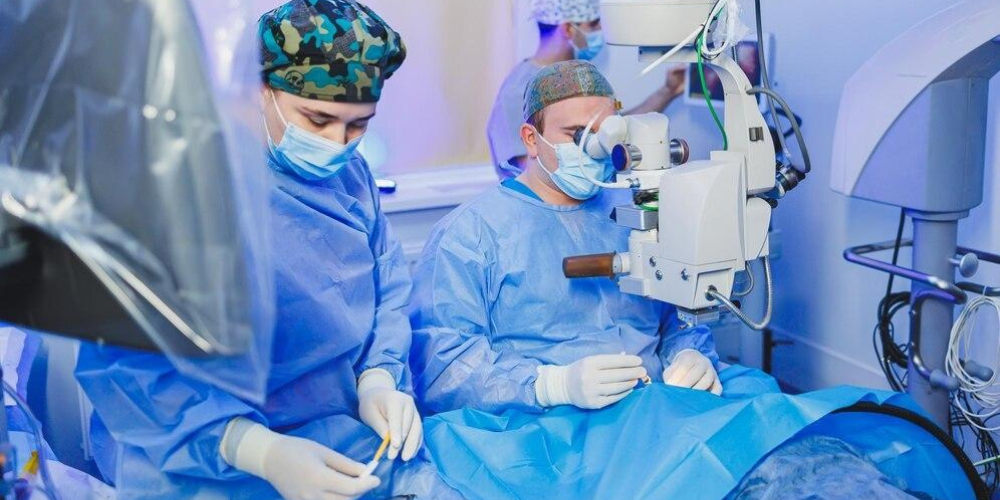
What Are the Disadvantages of Cataract Surgery?

Cataract surgery is a widely recognized procedure designed to improve vision by removing a cloudy lens and replacing it with a clear intraocular lens (IOL). Despite its high success rate and overall safety, it’s important to acknowledge that cataract surgery comes with its own set of disadvantages and risks. Understanding what are the disadvantages of cataract surgery is crucial for making a well-informed decision.
Understanding Cataract Surgery and Its Purpose

Freepik | pikisuperstar | The main aim of cataract surgery is to clear the clouded lens impairing vision.
The primary goal of cataract surgery is to remove the clouded lens that causes vision impairment. Cataracts can make your vision appear blurry, foggy, or less vibrant, affecting your ability to perform daily tasks. The only effective way to treat cataracts is through surgery. However, it’s crucial to be aware of the risks associated with this procedure before proceeding.
What Are the Disadvantages of Cataract Surgery
While cataract surgery is highly effective, there are several potential risks and disadvantages to consider:
- Risk of Infection – As with any surgical procedure, there is a risk of infection. Although rare, an infection in the eye can be severe and may require additional treatment, such as antibiotics or even further surgery.
- Bleeding – Bleeding inside the eye, known as intraocular hemorrhage, is another possible complication. This condition is uncommon but can lead to further vision problems if not treated promptly.
- Swelling – Swelling of the eye’s front part (corneal edema) or the retina (cystoid macular edema) can occur after surgery. While this swelling usually resolves on its own, it may require medication to reduce inflammation.
- Retinal Detachment – This is a rare but serious complication in which the retina peels away from the back of the eye. If not treated immediately, this condition can lead to permanent vision loss.
- Vision Problems Post-Surgery – Some patients may experience blurred vision, seeing halos, glare, or dark shadows after surgery. These visual disturbances can be temporary or, in some cases, may persist, requiring further medical attention.
- Displacement of the IOL – The artificial lens implanted during cataract surgery can sometimes shift out of place, leading to vision issues. In such cases, additional surgery may be needed to reposition the lens.
Posterior Capsular Opacification (PCO) and Its Impact
One of the most common postoperative complications is posterior capsular opacification (PCO), often referred to as a “secondary cataract.” This occurs when the posterior capsule, the membrane that holds the IOL in place, becomes cloudy after the eye has healed. This cloudiness can cause vision to become blurry again, similar to the original cataract.
If you experience PCO, your ophthalmologist may recommend a laser procedure called a YAG laser capsulotomy. This procedure creates an opening in the cloudy capsule, restoring clear vision. Although effective, this is an additional procedure that some patients may find inconvenient.
Recovery Period and Post-Surgical Care
The recovery period following cataract surgery can vary from person to person. During the days and weeks after surgery, it’s important to follow your doctor’s instructions carefully:
- Eye Drops – You will likely need to use prescribed eye drops to prevent infection and reduce swelling.
- Avoiding Certain Activities – You should avoid rubbing or pressing on your eye and protect it from water or soap. Additionally, your doctor may recommend wearing a protective eye shield when sleeping and advise on when it’s safe to resume activities like exercise and driving.

Freepik | During recovery from cataract surgery, you’ll likely use prescribed eye drops to prevent infection.
Financial Considerations
Cataract surgery costs can vary depending on several factors, including the type of IOL selected and your insurance coverage. Medicare typically covers the cost of cataract surgery if your vision tests at a certain level of acuity. However, private insurance plans may have different requirements, and you may still incur out-of-pocket expenses.
If you opt for premium IOLs, such as those that correct astigmatism or offer multifocal capabilities, these lenses may come with additional costs. It’s essential to discuss the financial implications with your ophthalmologist to understand what costs you may need to cover.
For individuals without insurance coverage, payment plans through the doctor’s office or employer-offered flexible spending accounts may help manage the costs. Exploring these options before surgery can alleviate some of the financial burdens associated with the procedure.
Is Cataract Surgery Right for You?
Cataract surgery offers a significant improvement in vision for most patients, but it’s not without its drawbacks. Being informed about the disadvantages of cataract surgery ensures that you enter the process with realistic expectations and are prepared to address any potential complications that may arise.
If you’re considering cataract surgery, it’s essential to have a detailed discussion with your ophthalmologist about the risks, benefits, and costs. This will help you make the best decision for your eye health and overall well-being.
More in Medical Conditions
-
How to Feel Good Every Day and Overcome Self-Doubt
How often do you wonder, “Am I good enough?” These thoughts can be exhausting, whether they concern your role as a...
August 16, 2024 -
How to Stay Healthy During Flu Season: 8 Ways to Protect Yourself
Flu season can be a challenging time, but understanding how to stay healthy during flu season can make all the difference....
August 9, 2024 -
What Is the Best Short Hairstyle for Over 60?
Finding the right hairstyle can make all the difference, especially when dealing with the challenges of fine hair. Plenty of short...
August 3, 2024 -
How to Get Out of a Depressive Slump With These Simple Tips
When feeling stuck in a depressive slump, it might seem like there’s no way out. However, understanding how to get out...
July 25, 2024 -
Is IBS a Disability? Here’s Everything You Need to Know
Irritable bowel syndrome (IBS) affects millions globally, presenting a complex mix of symptoms that can severely disrupt daily life. This condition...
July 20, 2024 -
What to Pack for a Cruise to the Bahamas – An Expert’s Checklist
Heading out on a Bahamas cruise promises an unforgettable vacation filled with stunning beaches, vibrant culture, and endless fun. To make...
July 10, 2024 -
Is Tequila a Depressant or an Upper?
When we think of alcohol, we typically consider it a depressant because it slows down brain activity, neural functions, and the...
July 5, 2024 -
Can Asthma Cause Lung Nodules?
Have you ever come across the term “lung nodule” during a medical report? These mysterious little lumps in the lung can...
June 26, 2024 -
Is It Safe to Travel to Paris? Essential Tips for Tourists
When considering a trip to Paris, one of the first questions that often arises is, “Is it safe to travel to...
June 20, 2024










You must be logged in to post a comment Login